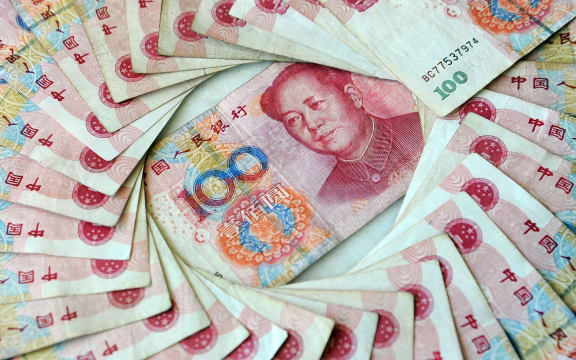The agreement to directly trade the New Zealand and Chinese currencies should bring more transparency to trading and make it easier for companies in each countries to invest in the other.

Yuan or Renminbi notes. Photo: AFP
It is also part of the world's second largest economy opening up its market and laying a claim to be an international reserve currency.
The deal means a marketplace will be set up where the renminbi, or yuan, will be traded directly against the New Zealand dollar by a number of banks including ANZ, Westpac and HSBC, rather than having to first convert it to US dollars, and then into the desired currency.
The Peoples' Bank of China fixes the renminbi against a basket of currencies on a daily basis, and it is then allowed to freely trade within a 2 percent range either side of the fixed price.
On Wednesday, the renminbi was trading at 6.13 against the US and its cross-rate against the Kiwi was 5.33.
ANZ bank head of institutional relationships Paul Goodwin says it's creating more transparency about how the renminbi trades.
He says China is one of New Zealand's major trading partners and the country is a very important source of foreign capital at this point in the economic cycle.
Mr Goodwin says the focus on developing economic relations between New Zealand and China that the Government and officials are pursuing is very important for New Zealand.
Total trade between China and New Zealand rose more than 25 percent last year to $18.2 billion.
HSBC's New Zealand head of global markets Gerard Field says the move will mean there will be active trading in the market and he points to the similar agreement between Australia and China as an example of this.
He says this time last year Australia did not have direct convertibility so there was about $A300 million a month in payment flows.
"If you fast forward to January 2014, they signed up their currency direct convertibility deal in April 2013, we're seeing monthly volumes of about 2.5 billion Aussie dollars".
Mr Field says it's lead to better liquidity in the market, made it easier to transact and it's provided a good market price at which to transact.

